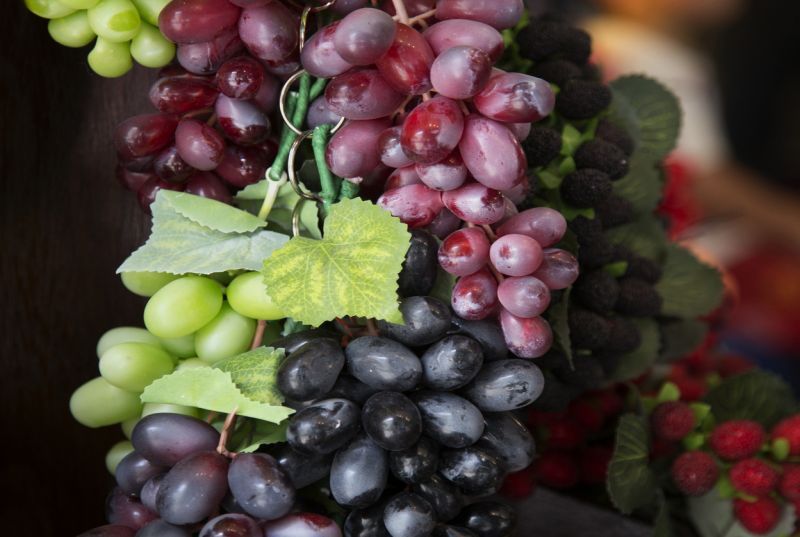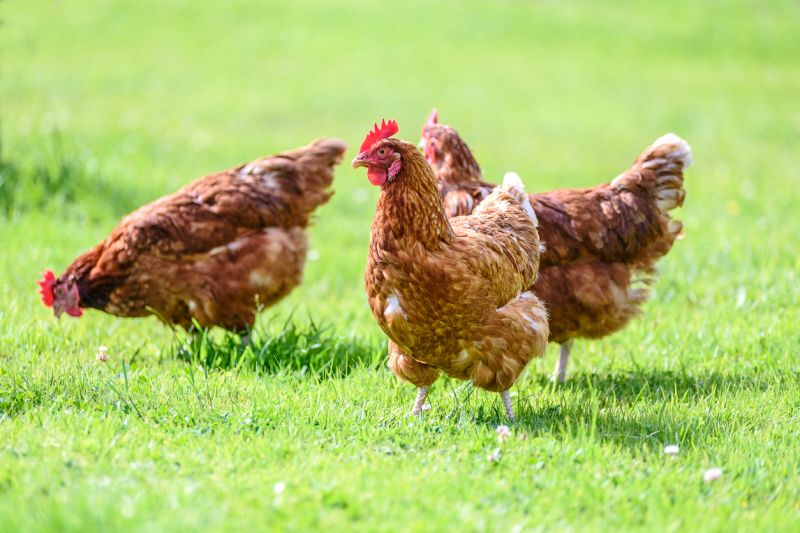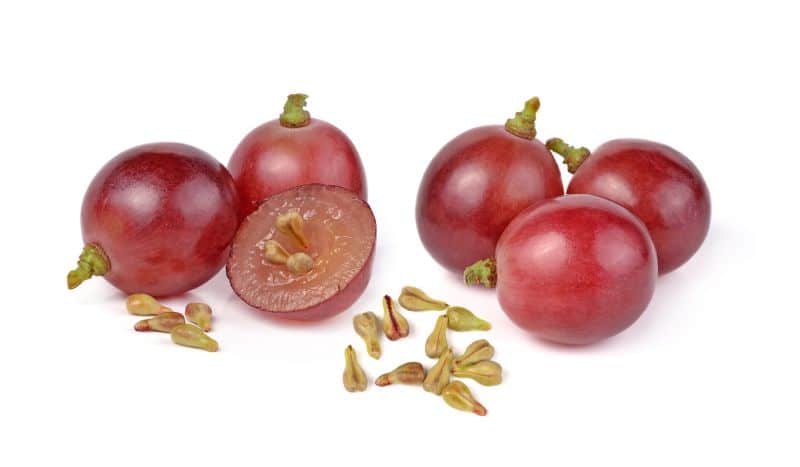Feeding chickens treats is a fun way to bond with your feathered friends. So, it’s a good idea to research the best bird treats. Can chickens eat grapes?
Grapes are known for being toxic to dogs because they lead to kidney problems. However, this problem isn’t true among all species. Let’s find out the answer to “can chickens have grapes?”
Can Chickens Eat Grapes?

Yes, chickens can eat grapes, as long as they’re not rotten. Like most human foods, grapes are best if served in moderation. Feeding chickens grapes is a great way to give them a special snack.
Can Chickens Eat Grape Vines?
Yes, chickens can eat grape stems and vines. They might not seem appealing to humans, but chickens enjoy pecking at the vine. However, vines may have pesticides sprayed on them while growing, so you should rinse them off like you would with grapes.
Can Chickens Eat Grape Seeds?
Yes, grape seeds are okay to eat, but not necessary. Grape seeds aren’t toxic like some fruit seeds are, but they could possibly cause intestinal blockages if not broken up enough. So, seedless grapes are the safest option.
Can Chickens Eat Wild Grapes?
Yes, chickens can eat wild grapes. If you were wondering, “do chickens eat grapes in the wild?”, the answer is yes! In the wild, grapes are a common treat for chickens to snack on. Plus, wild grapes won’t have pesticides on them like commercially-grown grapes might.
Can Chickens Eat Muscadine Grapes?
Yes, chickens love muscadine grapes. They have the same benefits, risks, and feeding suggestions as any other type of grape.
Can Chickens Eat Concord Grapes?
Yes, concord grapes are another type of grape that’s safe for chickens. Most chickens love them just as much as other types of grapes.
Can Chickens Eat Red Grapes?
Yes, the color of the grape doesn’t matter to chickens. They will likely enjoy all types of grapes, and they’ll reap the same benefits regardless of the color.
Can Chickens Eat Raisins?
Yes, chickens can eat raisins, but in much smaller amounts than grapes. Even though raisins are smaller, each one is higher in sugar because it’s more concentrated. Too many raisins could increase your chicken’s risk of obesity, so grapes are the safer alternative.
What About Jellies and Jams?
No, your chicken shouldn’t eat any jellies, jams, or preserves. Even though many of these have grapes in them, they are high in sugar and preservatives. Your chicken is better off eating grapes as opposed to processed grape products.
Are Grapes Good for Chickens?

Yes, grapes are healthy chicken treats. If chickens eat grapes, they’ll benefit from the vitamins and minerals inside the fruit. Grapes are high in vitamins A, B, C, and K. Vitamin C is essential for maintaining a healthy immune system and healing wounds.
Vitamin K and Vitamin D can help your chicken absorb calcium to keep their bones healthy. They have plenty of other ingredients to help with bone health too, such as calcium, potassium, manganese, and phosphorus.
They’re also rich in antioxidants, which help repair damaged cells in the body. They can prevent future damage from occurring and help maintain a healthy immune system. Ingredients in grapes could also improve vision and slow symptoms of aging.
While grapes have several benefits, they shouldn’t be a main part of your chicken’s diet. Yet, they can be a great occasional snack since they have few risks. Plus, most chickens seem to adore the sweet flavor.
Risks of Grapes for Chickens
Some people wonder, “are grapes bad for chickens?” No, they’re not poisonous or unhealthy, but there can be some downsides to serving them.
Even though grapes don’t have many risks for chickens, they could be a choking hazard. Whole grapes could cause a blockage, resulting in choking or an impacted crop. Crushing the grapes is a good way to avoid this risk.
Grapes are also high in sugar. Chickens can’t handle as much sugar as humans can because their digestive systems were designed differently. Too much sugar could lead to various digestive disorders, including a sour crop.
In the wild, chickens will eat as many grapes as they can get a hold of, but they’ll usually eat a lot of other things with them to balance it out. In captivity, chickens will eat whatever you give them, so provide them with a variety of treats to lower their sugar intake. Chickens who have free range time have a lower risk of being harmed by the sugar in grapes.
Some grapes may have pesticides on them if they were commercially grown. So, always wash them before serving them to your flock.
How Can You Give Chickens Grapes?

The best way to serve grapes or any other food to chickens is to cut or crush them into smaller pieces. Large pieces of grapes could get caught in a chicken’s throat and cause them to choke. So, wash the grapes and break them into smaller pieces first.
Treats like grapes shouldn’t make up more than 10% of each chicken’s diet. That 10% should be a mix of many kinds of treats, not just grapes. Then, the other 90% of their food should consist of a balanced feed that’s suitable for their life stage.
Instead of serving grapes every day or in large quantities, only offer a few grapes to your chickens every few days. If they’re crushed up enough, even baby chicks can eat them.
Frequently Asked Questions
If you’re wondering whether or not chickens can have grapes, there might be some similar questions lingering in your mind. Here are some answers to help you decide what treats to give to chickens.
Chickens have grapes often, both in the wild and in captivity, but there are plenty of other healthy fruits for them. Consider giving them bananas, apples, tomatoes, blueberries, blackberries, and cucumbers too.
Most fruits are safe for chickens in moderation, but you should avoid giving them avocado. The pits and skins of avocados have a toxin called persin, which is dangerous to many animals. Some seeds and pits, such as apricot, cherry, plum, pear, apple, and peach, are also considered dangerous for chickens.
Final Thoughts
Feeding grapes to chickens can be a great way to give them a healthy and tasty snack. Chickens need a lot of variety in their diets, so giving them new treats can help keep them happy and healthy. They can also get a lot of nutrients through foraging.
Like all snacks, be cautious about how many grapes you feed to chickens. Grapes can have many nutrients, but they can also be dangerous if given too often. So, an occasional snack is ideal.